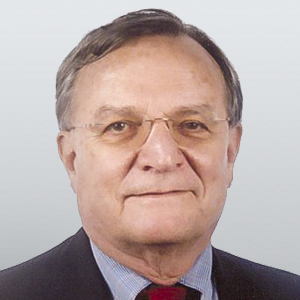Commentary
“In a country with two major parties, democracy is safe only if both care more about preserving the political system than about beating their opponents.”
If, without knowing who wrote those words, or in what publication they appeared, you had read them a year ago, just after the failed first attempt to impeach President Trump, what country and what parties would you have supposed the author was talking about?
No peeking now. Given that the country in question was the United States, which of the two parties would you imagine he or she intended as the one that, by implication, cared less “about preserving the political system than about beating their opponents”?
I’ll give you a hint. The words that follow the quotation above are these: “But one of America’s big parties is now willing to break the most basic rule of democracy: that free and fair elections should determine who gets to govern, and that those who lose must accept the legitimacy of their successor.” Now do you know?
That’s too easy! A year ago everybody would have known the answer to that one. If ever in American history—at least since 1824—one party has refused to accept the “free and fair” election and thus the legitimacy of the other, it was during the years 2016-2020.
What else was the Mueller investigation about? What else was impeachment, Mark One, about?
What else was the famed Democrat and deep state “Resistance” about?
Everybody knows this still—except, apparently, for Yascha Mounk, graduate of Cambridge and Harvard Universities and an associate professor at Johns Hopkins University.
In his role as contributing writer at The Atlantic, Professor Mounk is the author of both the quotations above, and he has a different answer to my questions about them, as he reveals in the words immediately following them:
“The danger for American democracy is far from over,” he writes. “Until the Republican Party banishes Trump and drops his big lie, every presidential election will be a potential extinction-level event.”
I know this idea of Mr. Trump as a “threat to democracy,” as well as a big liar, is not at all an uncommon one on the progressive left, or at The Atlantic magazine, which has lately become one of the progressive left’s most prestigious organs. And Professor Mounk is of course entitled to his opinion.
But shouldn’t he at least have mentioned the change in the political landscape by which, only four months ago, the electorally aggrieved parties in our threatened democracy have swapped roles?
How can the Democrats’ own “big lie” about Mr. Trump’s illegitimate presidency have been any less of a threat to that democracy than the one he is touting now?
I’m afraid that the history of the last four years has somehow slipped his mind.
Or did those years go by, for him as for so many of his persuasion, in a state of only partial awareness of what was really going on?
In other words, he knew, or thought he knew, what those whom he had chosen to regard as political enemies were doing, but he didn’t know what he and his political friends were doing—perhaps because they were all too busy doing it.
It wouldn’t have taken much in the way of self-awareness to spot that the terms in which he now describes the aggrieved Trump-supporters could equally well have described himself and his aggrieved Democratic friends a year or two back.
But neither self-awareness nor long memories have ever been the long suit of the media left, and I think I know why.
Last week Holman Jenkins Jr. of The Wall Street Journal published a column headed “What Altered the Public’s Taste for Lies?”
He was referring to “lies” on both sides. Those of Mr. Trump were taken for granted, but two in particular were mentioned that once enjoyed great currency on the media left: the one about Capitol Police officer Brian Sicknick’s supposedly having died as a result of a blow on the head from a fire extinguisher and the Russian “collusion” campaign of 2017-2019, which included many subsidiary lies, few of them acknowledged as false even today, as poor Officer Sicknick’s supposed cause of death now has been.
Mr. Jenkins’s answer to the question posed by his headline is that, “I partly blame Mr. Trump’s arrival on the political stage but not precisely for the reason you might think. His nonconformity, his brand of unauthorized and idiosyncratic lying, triggered a response from our national elites that amounted to ‘hooray, now we can lie more recklessly too.’”
But what if it was the other way around? What if Mr. Trump and his supposed “lies” were not the originators but the products of the culture of lying?
What if, once it became permissible for respectable politicians and journalists to accuse each other of lying without consequence, something which began to be the case under the Bush administration and has since become utterly routine, it also became routine to lie?
For if you are bound to be accused of lying by the other side whether you are lying or not, you might as well lie if it suits your convenience to do so.
Obviously, in such an environment of lies advertised as truth and truth advertised as lies—an environment in which the only way for most of us to tell the difference is by which side we’re on—someone like Yascha Mounk, whose intellectual stock in trade remains the “big lie” supposedly told by the other side, must rely on his own and his readers’ lack of any capacity for self-doubt and very short memories.
Otherwise, they could hardly help remembering the time, not so long ago, when the same “big lie” was being told by themselves.


No comments:
Post a Comment